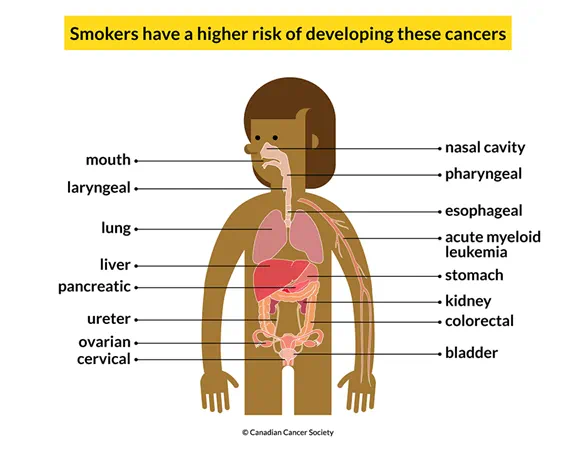Cigarettes: the hard truth
Smoking shortens lives

Our recommendation
It is never too late to quit smoking. You can benefit from quitting at any age, no matter how long you have been smoking. The sooner you quit, the lower your cancer risk.
Did you know?
Lung cancer is the leading cause of cancer death in Canada. About 72% of lung cancer cases in Canada are due to smoking tobacco. The longer a person smokes and the more cigarettes they smoke each day, the more their risk of cancer increases. People who smoke are at a higher risk of lung cancer if they’re also exposed to radon or certain chemicals in their home or workplace.
Tobacco use is the number 1 preventable risk factor for disease and death in Canada. Find out about our advocacy work in tobacco control.
Top 6 reasons people say they smoke
Nicotine is a powerful, addictive drug found naturally in tobacco. When you smoke, nicotine quickly reaches your brain and briefly boosts your mood, making you feel calm and more alert. But over time, your energy level and mood can drop, causing you to crave another cigarette. Then you smoke again, repeating the cycle. The more you smoke, the more nicotine you need.
Good news: you can quit smoking for good. Many people have found success with quitlines, nicotine replacement therapies and other support.
Many people who smoke believe that smoking relaxes them. In fact, it does the opposite to your body. Smoking makes your heart beat faster, makes you breathe faster and raises your blood pressure.
Why do some people who smoke feel relaxed when they smoke? Often, it’s because smoking relieves the nicotine withdrawal that occurs between cigarettes. It also releases dopamine – a chemical in your brain that creates feelings of pleasure. But this feeling of relaxation lasts for only a few moments. Often, it’s not the cigarette, but taking a break from work or a stressful situation that creates the real relaxation.
6 benefits of quitting
Playing a sport, going to the gym and living an active life is much easier when you quit smoking.
When you smoke, your heart has a harder time keeping up with the demands of exercise, so your body wastes a lot of heartbeats just trying to keep up during exercise. Smoking also affects your lung capacity, your ability to gain and maintain muscle and your overall energy level. Quitting makes it easier to exercise and frees up time to do so. You’ll have more time for activities you love, like swimming, cycling and other hobbies without needing to stop for a smoke.
Amazing ways your body bounces back — from the minute you stop smoking
- 20 minutes after quitting: Your blood pressure starts to lower.
- After 8 hours: The level of carbon monoxide (a toxic gas) in your blood drops to normal.
- After 24 hours: Your risk of having a heart attack starts to drop.
- After 2 weeks to 3 months: The airways in your lungs relax and you can breathe easier.
- After 1 to 9 months: You cough less and your lungs are even stronger.
- After 1 year: Your added risk of coronary heart disease is half that of someone who smokes.
- After 5 years: You have the same chance of having a stroke as someone who does not smoke. Your risk of getting mouth, throat, esophageal or bladder cancer is half of what it was when you smoked.
- After 10 years: Your risk of getting lung cancer is about half of what it was when you smoked.
- 15 years after quitting: Your risk of coronary heart disease is similar to that of someone who has never smoked.
Every cigarette you smoke can take years off your life
More of the chemicals found in tobacco smoke
Did you know?
Do you know how to live smoke-free?
Your trusted source for accurate cancer information
With support from readers like you, we can continue to provide the highest quality cancer information for over 100 types of cancer.
We’re here to ensure easy access to accurate cancer information for you and the millions of people who visit this website every year. But we can’t do it alone.
Every donation helps fund reliable cancer information, compassionate support services and the most promising research. Please give today because every contribution counts. Thank you.
